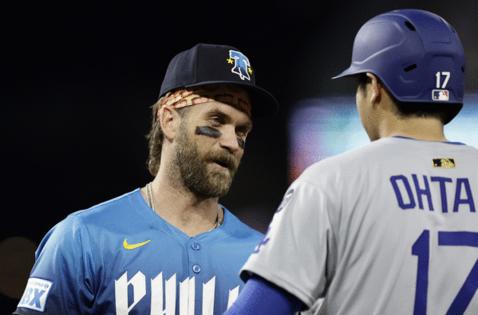David Murphy: A Phillies-Dodgers series would be epic ... and way too short in MLB's absurd playoff format
Published in Baseball
PHILADELPHIA — It’s a shame we have to ask the question. Dave Dombrowski answered it the only way he could. Things are the way they are. The only mindset a baseball team can have right now is to focus solely on the road it must travel.
“You’re in a position where you know what the rules are,” Dombrowski said as he sat in the Phillies dugout on Tuesday.
But, let’s be clear. The rules are absurd.
What sense does it make to “reward” the top two teams in each league with five days off and then make them play a series that isn’t guaranteed to last five days total?
For a second straight season, the Phillies find themselves having to navigate a road that history suggests places its thumb on the scale in favor of its opponent. Since 2022, six of the 12 teams with a first-round bye have gone on to lose in the MLB division series. It’s a small sample, given the new format. But if we are to assume that the goal of any postseason structure is to create a representative environment that accurately identifies the best of the best teams, then the math would suggest that the two “best” teams at the outset should fare better than 50/50.
Fact is, the baseball playoffs are uniquely unrepresentative. By nature. The competitive environment of the regular season is in which teams play 162 games over the course of 183ish days. There is no format that will completely account for that. Which is why, for much of baseball’s history, the format was simply the regular season followed by the World Series. The problem with the current format is that it exacerbates the issue to an extent that it becomes an entirely different season.
Talk to any baseball player and he’ll tell you that the key to the sport is finding a rhythm, finding a groove. Few teams collectively found that rhythm like the Phillies did this season. After some fits and starts that led to some serious trade deadline augmentation, they played at a 106-win pace over the last two months of the season. They played 54 games in 59 days and won 35 of them. Now, suddenly, they have five days off, then must win three out of five games.
Don’t get me wrong. They’d rather be them. The math says as much. They are 100% guaranteed to face the Dodgers or the Reds in the NLDS. Right now, their eventual opponent faces much longer odds of facing the Phillies.
“We want to go straight to the division series and do things like that,” Phillies second baseman Bryson Stott said. “That’s what we wanted to do and we accomplished that.”
But there is a paradox here. While the Dodgers and the Reds are less likely to make the NLDS, there is an argument to be made that whichever team gets there will be in better shape than the Phillies. This will be particularly true if that team is the Dodgers, who would have the rhythm of having won two games in three days while also having the depth to negate the advantages the Phillies get by not playing.
“It’s an advantage if you win the first series, and it’s an advantage if you don’t,” Dombrowski joked. “I think our guys, they play a lot of games, so I don’t think it hurts to have [the break]. I think we’ll look to use it to our advantage.”
From a broader perspective, it’s hard to see how it makes sense. There’s a good chance that, three days from now, Major League Baseball and its television overlords at TBS will luck into a postseason baseball series that is as viewer-friendly as any they could have concocted. On every front, a Phillies-Dodgers NLDS would make for the sort of programming that lands people bonuses they did not earn.
— Two of the top five television markets in the country.
— Two of the largest fan bases in baseball.
— One of the country’s most passionate cities against … one of its largest.
And, hey, don’t forget about the actual game on the field. The Phillies and Dodgers entered the postseason as two of the three top betting favorites to win the World Series. An NLDS between these two teams would feature the NL’s top two MVP favorites (Kyle Schwarber and Shohei Ohtani), four former MVPs (Ohtani, Mookie Betts, Freddie Freeman, Bryce Harper) two of its top three hitters for average (Trea Turner, Freeman), one Cy Young favorite (Cristopher Sánchez), and two-time Cy Young winner (Blake Snell). Plus, Clayton Kershaw and Aaron Nola potentially coming out of the bullpen.
A Dodgers-Phillies series would be a showcase-level event, the sort of thing that baseball should want to draw out as long as possible. Yet one of those teams will come out of Game 1 feeling as if its back is against the wall.
Like Dombrowski said, you play the cards you are dealt. The Phillies benefited from them in 2022. They saw the opposite side in 2011 and 2024. It’s just a shame that baseball can’t figure out a way to make the NLDS adhere to the seven-game standard.
©2025 The Philadelphia Inquirer. Visit inquirer.com. Distributed by Tribune Content Agency, LLC.







Comments